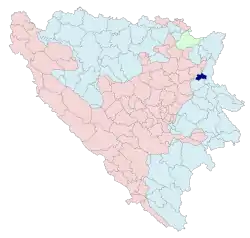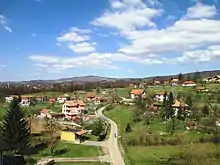Osmaci
Osmaci (Serbian Cyrillic: Осмаци) is a village and a municipality located in eastern Republika Srpska, an entity of Bosnia and Herzegovina. As of 2013, it has a population of 6,016 inhabitants.
Osmaci
Осмаци | |
|---|---|
Village and municipality | |
 Location of Osmaci within Bosnia and Herzegovina | |
 | |
| Coordinates: 44°24′05″N 18°55′03″E | |
| Country | Bosnia and Herzegovina |
| Entity | Republika Srpska |
| Government | |
| • Mayor | Ljubo Petrović (SDS) |
| Area | |
| • Total | 78.1 km2 (30.2 sq mi) |
| Population (2013 census) | |
| • Total | 6,016 |
| • Density | 77/km2 (200/sq mi) |
| Time zone | UTC+1 (CET) |
| • Summer (DST) | UTC+2 (CEST) |
| Area code(s) | 56 |
History
The municipality was created from part of the territory of the pre-war municipality of Kalesija that was assigned to Republika Srpska by the Dayton Agreement. The rest of the Kalesija municipality is in the Federation.
Demographics

Population
| Population of settlements – Osmaci municipality | |||||
|---|---|---|---|---|---|
| Settlement | 1971. | 1981. | 1991. | 2013. | |
| Total | 6,016 | ||||
| 1 | Borogovo | 276 | 252 | ||
| 2 | Caparde | 855 | 909 | ||
| 3 | Hajvazi | 569 | 504 | ||
| 4 | Mahala | 626 | 578 | ||
| 5 | Matkovac | 491 | 347 | ||
| 6 | Osmaci | 800 | 709 | 844 | 1,029 |
| 7 | Rakino Brdo | 239 | 222 | ||
| 8 | Sajtovići | 353 | 232 | ||
| 9 | Šeher | 1,187 | 579 | ||
| 10 | Viličevići | 555 | 394 | ||
Ethnic composition
| Ethnic composition – Osmaci town | |||||||
|---|---|---|---|---|---|---|---|
| 2013. | 1991. | 1981. | 1971. | ||||
| Total | 1,029 (100,0%) | 844 (100,0%) | 709 (100,0%) | 800 (100,0%) | |||
| Serbs | 798 (94,55%) | 702 (99,01%) | 796 (99,50%) | ||||
| Bosniaks | 35 (4,147%) | ||||||
| Others | 7 (0,829%) | 4 (0,500%) | |||||
| Yugoslavs | 3 (0,355%) | 6 (0,846%) | |||||
| Croats | 1 (0,118%) | 1 (0,141%) | |||||
| Ethnic composition – Osmaci municipality | |||||||
|---|---|---|---|---|---|---|---|
| 2013. | |||||||
| Total | 6,016 (100,0%) | ||||||
| Serbs | 3,095 (51,45%) | ||||||
| Bosniaks | 2,895 (48,12%) | ||||||
| Others | 17 (0,283%) | ||||||
| Croats | 9 (0,150%) | ||||||
Mass grave
In the village Hajvazi, located in Osmaci, on 20 September 2012, the International Commission on Missing Persons uncovered a mass grave containing the remains of eight Bosnian Muslim individuals, seven men and one woman killed by Serbs in November 1992 during the Bosnian War.[1][2][3] The victims were piled atop of each other. Their remains were exhumed from the mass grave, which was located in the yard of a private house.[4][5] The exhumation concluded on 27 September 2012 and the remains were transported to the Commemorative Centre in Tuzla for forensic testing and DNA analysis to determine the identity of the victims.[6] Following the discovery of the eight victims, there are still an additional 30 Bosnian Muslim victims from the Osmaci area that remain missing.[7]
On 1 June 2013, some of the victims found in the mass grave were buried in a Šehidsko mezarje (Martyr Cemetery) in Memići alongside victims found in the Crni Vrh mass grave and the mass grave in Kazanbašča by Zvornik.[8]
See also
References
- "Otkrivena masovna grobnica u naselju Hajvazi". Hayat. 20 September 2012. Retrieved 4 May 2015.
- "Otkrivena masovna grobnica u mjestu Hajvazi". Oslobođenje. 20 September 2012. Retrieved 4 May 2015.
- "INO BiH: Otkrivena masovna grobnica u naselju Hajvazi, na području općine Osmaci". 24 sata. 20 September 2012. Archived from the original on 20 June 2018. Retrieved 4 May 2015.
- "BIH:Iz masovne grobnice na lokalitetu Hajvazi ekshumirano osam žrtva". Slobodna Evropa. 27 September 2012. Retrieved 4 May 2015.
- "Otkrivena masovna grobnica u naselju Hajvazi, na području općine Osmaci". Vijesti. 20 September 2012. Archived from the original on 18 May 2015. Retrieved 4 May 2015.
- "Iz masovne grobnice na lokalitetu Hajvazi ekshumirano osam žrtava". Hayat. 27 September 2012. Retrieved 4 May 2015.
- "Pronađena masovna grobnica u opštini Osmaci". Justice Report. 27 September 2012. Retrieved 4 May 2015.
- "U Memićima klanja zajednička dženaza za 11 Zvorničana". Rijaset. 4 June 2013. Archived from the original on 18 May 2015. Retrieved 4 May 2015.
